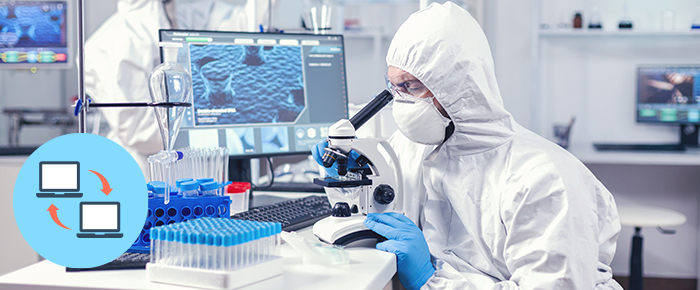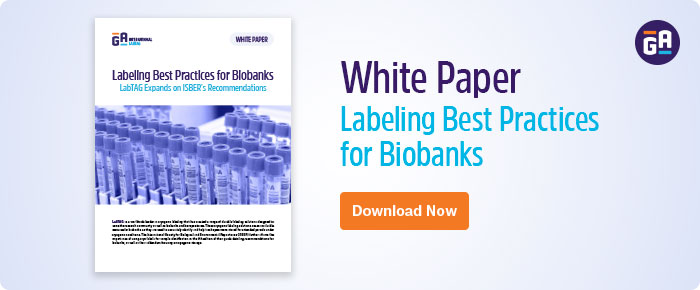
There is a growing movement internationally to improve access to research data, as well as sharing biospecimen data stored by biobanks and biorepositories. Sharing biospecimen collections and their associated data can increase their long-term value and lead to a more significant number of discoveries, especially in the case of rare diseases. However, various legal and technical hurdles need to be addressed first, including the issue of informed consent.
Data sharing is an essential part of scientific research for developing new knowledge and creating improved healthcare treatments. This is predicated on discovering new biomarkers, diagnostic tools, and drug treatments that various researchers can validate to confirm each other’s findings. This is especially true for research into rare diseases due to the scarcity of research participants, patient samples, and resources for any given disease1.
While there is broad consensus on the benefits of sharing data and specimens in the scientific community, in practice, there is often resistance by various institutions that fear they will not receive credit or proper recognition for their efforts or investments. Whether these fears are real or perceived, they can inevitably result in vulnerable patient groups being negatively affected. As such, a legal framework that clearly established how researchers could ethically share data and samples while maintaining scientific rigor is vital. Furthermore, these agreements would invariably be written with hard-to-understand legal terms, necessitating a simplified overview of the basic principles.
Charter of Principles
The charter of principles intends to provide an integrated model for sharing information across national borders and address contradictory legal and ethical frameworks1. Built upon previous consensus documents and position statements, the charter is a tool that enables the effective and transparent sharing of data and biospecimen and helps endure uniformity of access across projects and countries1. Designed to be clear, concise, and easy to understand, it can be regarded as a basic global agreement for sharing data, with a view towards addressing emerging issues.
The guiding principle of the charter is simply that research conducted through biobanks and biorepositories is far more effective if access to sufficient data is granted1. The charter covers several important aspects of sharing data, including security and privacy. When sharing patient samples, informed consent must be given, and the samples should be anonymous, with no links to the individual donor. In addition, access and use of data and samples must be based on the request’s scientific validity and potential benefit. Results generated from this shared data must also be relayed back to the providers to ensure awareness of outcomes relevant to their collections or the donors. Proper recognition must also be attributed to the researchers who invested time and effort in collecting the biospecimen and information databases being shared. Conversely, these researchers are expected to ensure the quality of the shared samples and data.
Informed Consent vs. Broad Consent
Population biobanks store human biospecimen and health data collected from thousands of healthy and sick patients. This type of biobank is quickly emerging as a promising research tool worldwide, helping to facilitate research on the development of personalized medicine2. This is due to their ability to catalog genomic and phenotypic variations across populations for a given disease. This data also allows scientists to establish connections between various environmental and genetic factors, including diet, access to healthcare, gender, and ethnicity, on developing diseases. It has been suggested that the more researchers have access to biobank data and samples, the faster these promised biomedical advances can be achieved2.
Participants are often asked to provide broad consent to research when contributing biological material and data. In the context of biobanking, broad consent grants researchers permission to use the material in a range of research projects that may not be fully defined at the time of subject recruitment. This differs from blanket or open consent as there are still some limitations on what the data and samples may be used for, including restricting its use to a particular research subject or disease type. Broad consent may also still be overseen by an oversight body or ethics committee that ensures the aims of the biobanks, as described to the subject, are respected. While this helps ensure biospecimen are available for a greater number of research projects, it also means participants are not fully informed of the risks and benefits of the research they are contributing to.
A Possible Solution
Several biobanks have adopted a mechanism that establishes a compromise between informed and broad consent. They regularly re-contact donors to ask for new data or specimens, keep them informed, and provide essential updates regarding the biobank and their samples2. As some researchers argue that traditional informed consent is too restrictive for biobank research, this could serve as an agreeable middle ground. Overall, as long as ethical concerns are considered and there are appropriate privacy protocols in place, it is argued that broad consent for biospecimen used by biobanks should be allowed. This will permit biorepositories and biobanks to make decisions in the future that will impact the data and samples they store without needing to consult the various participants each time.
Future Considerations
Biobanks must take the proper steps to ensure transparent policies are in place for the proper use and storage of biospecimen, including guidelines that outline who should receive samples and data for research purposes. This is particularly important when dealing with biospecimen as these samples are not a renewable resource and can be exhausted. Data can be more freely shared, though care should still be taken when determining who to share the information with.
The first question biobanks must pose prior to sharing biospecimen samples, and their associated data is how potential partners will be chosen. Will they simply employ a first-come, first-served policy, or will they have a formal application process with a review. If a review process is instituted, what factors will be looked at, from the requester’s location to the research proposal, support structure, and projected results? As the demand for samples increase, the need for a formal review process becomes even more vital. Moreover, the cost of sharing biospecimens must also be considered. Sharing specimens can engender nontrivial costs and can be a fairly complex process. As such, these costs must be accounted for and should be incorporated into any discussion about sharing samples.
LabTAG by GA International is a leading manufacturer of high-performance specialty labels and a supplier of identification solutions used in research and medical labs as well as healthcare institutions. Make sure to visit our biobanking solutions page for more information.
References:
- Allen C, Joly Y, and Granados Moreno P. Data Sharing, Biobanks and Informed Consent: A Research Paradox? McGill Journal of Law and Health. 2013
- Mascalzoni D, Dove ES, Rubinstein Y, Dawkins H, Kole A, McCormack P, Woods S, Riess O, Schaefer F, Lochmüller H, Knoppers BM, and Hansson M. International Charter of principles for sharing bio-specimens and data. European Journal of Human Genetics. (2015) 23, 721–728.




